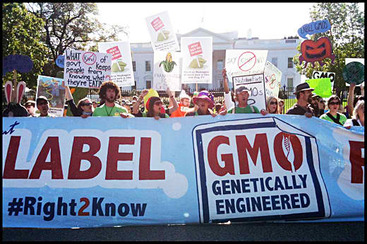
In California, however, a group of food advocates have formed The Committee for the Right to Know. They have prepared an initiative for the November 2012 ballot which states, "The purpose of this measure is to create and enforce the fundamental right of the people of California to be fully informed about whether the food they purchase and eat is genetically engineered and not misbranded as natural so that they can choose for themselves whether to purchase and eat such foods."
Robert Kenner, filmmaker of FOOD, Inc. just released a short video called, "Labels Matter" which he produced in partnership with another GMO label advocacy group, Just Label It (visit their website and sign the national petition!). The video is part of Kenner's Fix Food Project which is a social medium platform to empower Americans to take immediate action to create a more sustainable and democratic food system. One of the first films I saw that talked about GMO's was a short video that went viral in 2007 by Free Range Studios called, Mouth Revolution. Check it out!
Some will say that genetically modified seeds are helping to feed the world by making seeds more available. But people have been saving seeds for thousands of years. Genetically engineered seeds are fixing a problem that isn't broken. Ironically, GMO's are what break the system because they perpetuate chemical intensive, environmentally harmful, conventional farming practices. But like so many things today, success is only measured when a process is industrialized and centralized. Seeds, the smallest thing in our food system, is not spared. Big agri-business wants to control it all. GMO’s aren't so much about making seeds more readily available as they are about streamlining the business to create a super seed that is weed and pest resistant. We don’t need a battery of tests to tell us that if a seed has built-in capabilities to combat pests that we are more or less eating rat poison.
Here are some interesting facts I learned in an October 2011 issue of Better Nutrition:
- 80% of corn is genetically modified. And corn in all its shapes and sizes are in just about every processed food.
- Even if you can avoid corn, try avoiding sugar. Most sugar, whether cane sugar or from sugar beets, is genetically engineered.
- According to the American Academy of Environmental Medicine, patients are probably seeing negative health effects right now from GM foods but their doctors don’t realize that GM foods may be to blame.
- Of the little research that has been published, infertility and reproductive problems are the two biggest health risks found in animal research. The American Academy of Environmental Medicine also found health concerns involving the immune system, gastrointestinal problems, cholesterol problems and disruption of insulin. The later makes you wonder if that has anything to do with the rise in Type II Diabetes. Coincidence?
- The European Union, Japan, Australia, Brazil, Russia, and even China require labeling on all food containing GMO’s so consumers can make informed decisions. What a novel idea!

 RSS Feed
RSS Feed
